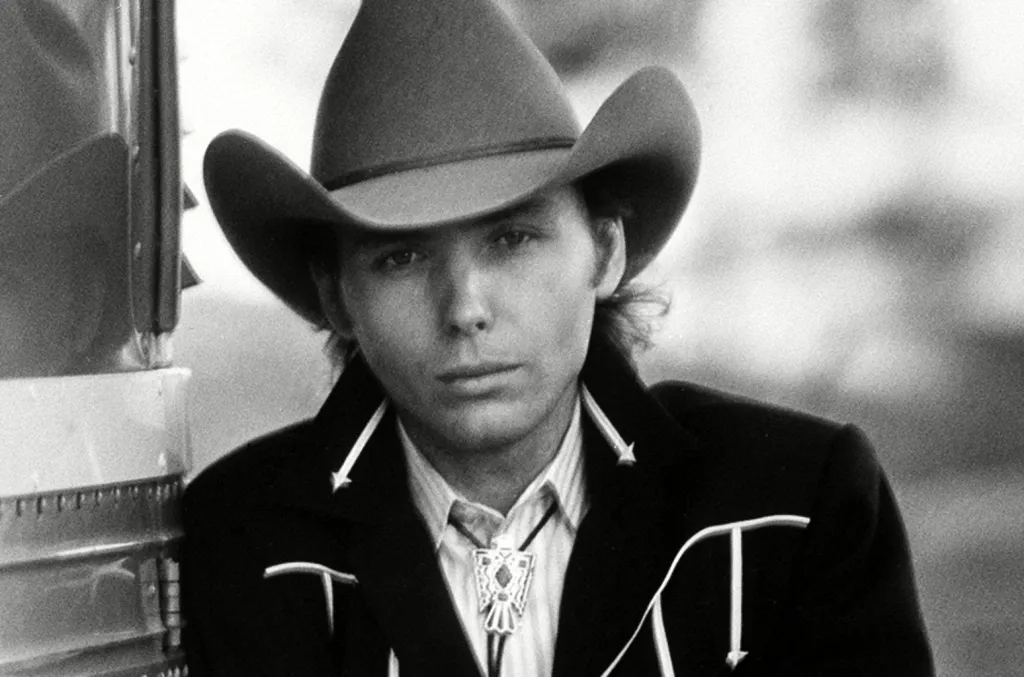
Heartbreak with a backbeat: a kiss-off that swivels its hips and walks away smiling.
Let’s set the essentials where you can see them. “Fast as You” is Dwight Yoakam at his most radio-sure and self-authored—written by Yoakam, produced by Pete Anderson, and released as the third single from the triple-platinum album This Time on October 4, 1993 (Reprise). It peaked at No. 2 on Billboard Hot Country Songs, crossed to the Hot 100 at No. 70, and reached No. 5 on Canada’s RPM Country Tracks. Depending on the pressing, the B-side reads “Home for Sale” or “Let’s Work Together.” The parent album This Time—Yoakam’s most commercially successful—spun off three consecutive No. 2 country singles (“Ain’t That Lonely Yet,” “A Thousand Miles from Nowhere,” and “Fast as You”) and has long been certified 3× Platinum in the U.S.
The “story behind” is as plainspoken as the groove itself. After years of sharpening a Bakersfield-leaning sound on the West Coast club circuit, Yoakam and Anderson found a modern frame that didn’t sand off the twang. “Fast as You” is the playful side of that breakthrough: a strutting rejoinder to a lover who expects to outrun consequences. The title line isn’t a threat so much as a shrug—I can learn to leave as quickly as you do. What keeps it from bitterness is the record’s shape: a circular guitar figure that critics love to compare to “Pretty Woman”, smoky keyboards underneath, and a rhythm section that walks instead of stomps. You can feel the confidence: no grandstanding, just a band so sure of its pocket that the smile carries the sting.
Sit with the sound a moment and the details bloom. Anderson’s lead guitar snaps and slaloms, answering Yoakam’s phrases without crowding them. The drums sit right on top of the beat—tight, unfussy, dance-floor ready—while the organ warms the edges like neon bleeding into sawdust. And Yoakam’s tenor—pure Kentucky steel with a little Hollywood shine—does what great country voices do at their best: he makes resolve sound kind, even when the lyric sharpens. It’s a grown-up trick, and older ears will recognize it instantly. He’s not raging at the past; he’s reclaiming his agency with a wink and a backbeat.
Part of why the single still lands is where it sits in Yoakam’s arc. This Time wasn’t a retreat to nostalgia; it was a widening of the frame. The album kept the Bakersfield grammar—Telecasters, shuffle sense, lonesome pride—but let in new colors and a little pop air without losing nerve. That’s how you get a record that plays fine between a bar’s clatter and a family car’s dash speaker. The charts simply tell you the public heard it the same way: three straight No. 2s, the biggest pop crossover of his career for this track, and a long afterlife on playlists and dance floors.
The video helped, too. Shot as a performance piece and directed by Yoakam with Carolyn Beug—a frequent collaborator who also worked on his other 1993 clips—it leans into live energy rather than concept. You see exactly what you hear: a band comfortable in its skin and a frontman who sells mischief without malice. (Beug, a respected producer-director who later died in the 9/11 attacks, is often rightly remembered for the unshowy clarity of these country videos.)
As writing, “Fast as You” is tidy and sly. Verse by verse, Yoakam sketches a familiar pattern—someone who loves the chase more than the catch—and flips it with a chorus that refuses to play the mark. The humor is dry; the dignity, intact. No name-calling, no grand moral—just a decision to keep one’s self-respect moving forward at highway speed. For listeners who’ve logged a few decades of their own, that’s where the real sweetness lies. It’s a song about leaving that never sounds lonely, because the leaving is really about choosing yourself.
What lingers, finally, is the mood: a little neon, a little dust, a little shoulder-roll that says I’ll be fine. You can hear the years Yoakam spent learning how to swing rather than bludgeon, how to let space in the arrangement carry what words don’t need to say. It’s why the record never dates. The hook circles and circles; the organ hums; the guitars grin; and that title line lands like a friendly warning and a promise to one’s own heart.
Put it on tonight and let that first guitar figure loop through the room. The song doesn’t ask for your sympathy; it offers you your balance back. That’s the quiet brilliance of “Fast as You”: it makes resilience feel like a dance you already know.